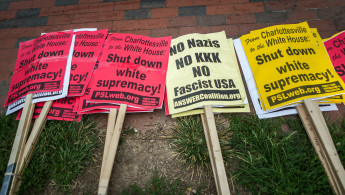US neo-Nazi stands trial for Charlottesville car rampage
James Fields, 21, also faces hit-and-run charges as well as eight counts of causing serious injury to others struck by the black Dodge Challenger he allegedly drove at the "Unite the Right" protest on August 12, 2017.
The rampage resulted in the death of Heather Heyer, 32, and highlighted the growing audacity of the far-right under Trump, whose rhetoric and policies are blamed by critics for a spike in racist and anti-Semitic violence.
The president drew broad criticism following the attack when he spoke of "blame on both sides", and appeared to establish a moral equivalence between the white supremacists and anti-racism protesters.
Jury selection begins from Monday and is estimated to last around two days, with the full trial expected to take up to three weeks to complete.
If convicted of first degree murder Fields faces between 20 years to life in prison. His legal team earlier failed to shift the trial away from Charlottesville, where they argued it would be impossible to impanel an unbiased jury.
Fields has been separately charged with federal hate crimes including one offense which carries the death penalty. A trial date has not yet been set for that case, and prosecutors have not indicated whether they will seek the maximum punishment.
Hitler obsessed
The Unite the Right rally was organized by white nationalists Jason Kessler and Richard Spencer to protest the removal of a statue of Robert E Lee, the top Confederate general during the 1861-1865 US Civil War.
The protest saw hundreds of neo-Nazi sympathisers, accompanied by rifle-carrying men, yelling white nationalist slogans and wielding flaming torches in scenes eerily reminiscent of racist rallies held in the US South before the Civil Rights movement of the 1950s and 60s.
On the second day of demonstrations, 12 August, fighting broke out between neo-Nazi supporters and anti-fascists from a black-clad group called Antifa.
The violence culminated with Fields' alleged attack.
According to his federal hate crimes indictment, Fields had multiple social media accounts where he expressed support for white supremacism and the racial policies of Adolf Hitler and the Third Reich, and advocated violence against black people and Jews.
The Toledo Blade, a local newspaper from Ohio where Fields lived, reported he enlisted in the army in August 2015, but was discharged in December "due to a failure to meet training standards".
The specter of violence by right-wing extremists was once more in the spotlight last month when Cesar Sayoc, a Trump mega-fan, sent 15 pipe bombs to the president's political opponents and media critics.
On 27 October, Robert Bowers was accused of slaughtering 11 people in a Pittsburgh synagogue, shouting "All Jews must die" before opening fire with his arsenal of guns in the worst anti-Semitic attack in modern US history.





 Follow the Middle East's top stories in English at The New Arab on Google News
Follow the Middle East's top stories in English at The New Arab on Google News


